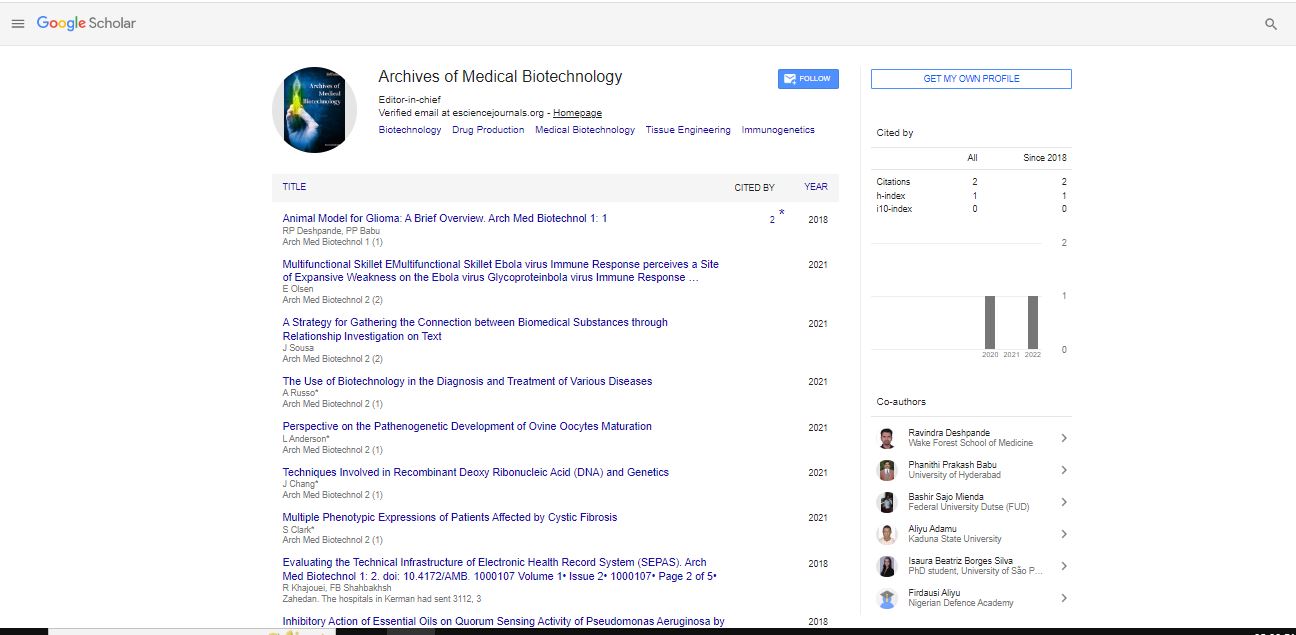Editorial, Arch Med Biotechnol Vol: 6 Issue: 1
Gene Therapy in Indian Medical Biotechnology
Meera Kulkarni*
Department of Genetics, National Institute of Biomedical Genomics (NIBMG), Kalyani, India
- *Corresponding Author:
- Meera Kulkarni
Department of Genetics, National Institute of Biomedical Genomics (NIBMG), Kalyani, India
E-mail: meera.kulkarni@nibmg.ac.in
Received: 01-Mar-2025, Manuscript No. AMB-25-170189; Editor assigned: 4-Mar-2025, Pre-QC No. AMB-25-170189 (PQ); Reviewed: 20-Mar-2025, QC No AMB-25-170189; Revised: 26-Mar- 2025, Manuscript No. AMB-25-170189 (R); Published: 30-Mar-2025, DOI: 10.4172/amb.10000
Citation: Meera Kulkarni, Department of Genetics, National Institute of Biomedical Genomics (NIBMG), Kalyani, India. Arch Med Biotechnol 6:1.
Copyright: © 2025 Meera Kulkarni, this is an open-access article distributed under the terms of the Creative Commons Attribution License, which permits unrestricted use, distribution, and reproduction in any medium, provided the original author and source are credited.
INTRODUCTION
Gene therapy represents a groundbreaking approach in medical biotechnology, aiming to correct defective genes responsible for diseases. With the advent of CRISPR-Cas9 and viral vector technologies, gene therapy is entering clinical practice worldwide [1].
Applications in India
In India, gene therapy research is being explored for hemophilia, sickle cell anemia, and thalassemia—conditions with high prevalence in the country [2]. Recent advances in lentiviral and adeno-associated virus vectors allow targeted gene delivery with minimal side effects. Research on gene editing is also expanding for inherited retinal disorders, muscular dystrophy, and certain forms of cancer [3]. The Indian government has identified gene therapy as a priority area, with dedicated funding to accelerate translational research.
Challenges and Opportunities
Challenges include high treatment costs, ethical issues around germline editing, and regulatory approvals. Nonetheless, Indiaâ??s large patient base offers unique opportunities for clinical trials and innovation in affordable therapies [4]. Collaborative projects with biotechnology companies are driving indigenous gene therapy programs [5].
CONCLUSION
Gene therapy is poised to transform management of genetic disorders in India. With advances in CRISPR and vector design, coupled with strong research initiatives, India can emerge as a leader in affordable gene therapies.
REFERENCES
- Nair R. Gene therapy: emerging trends. Indian J Hum Genet. 2013;19: 155–160.
- Verma IC. Thalassemia in India: current status. Indian J Pediatr. 2000;67: 517–521.
- Sengupta S. Gene editing and CRISPR technology. Curr Sci. 2016;111: 174–180.
- Sharma R. Challenges in gene therapy in India. Indian J Med Ethics. 2018;3: 45–50.
- Narayanan G. Clinical trials in gene therapy. J Postgrad Med. 2019;65: 125–130.
 Spanish
Spanish  Chinese
Chinese  Russian
Russian  German
German  French
French  Japanese
Japanese  Portuguese
Portuguese  Hindi
Hindi 